- Home
- Kirsty Murray
India Dark
India Dark Read online
KIRSTY MURRAY was born in Melbourne and lives there still, though she has tried on many other cities and countries for size. She has been a middle child in a family of seven children, a mother to three and stepmother to three more, as well as godmother and friend to many amazing people. She has loved books, stories and people all her life, and is the author of nine novels.
OTHER NOVELS
BY KIRSTY MURRAY
Vulture’s Gate
Zarconi’s Magic Flying Fish
Market Blues
Walking Home with Marie-Claire
Children of the Wind
Bridie’s Fire
Becoming Billy Dare
A Prayer for Blue Delaney
The Secret Life of Maeve Lee Kwong
India Dark
KIRSTY MURRAY
This project has been assisted by the Australian Government
through the Australia Council, its arts funding and advisory body.
First published in 2010
Copyright © Kirsty Murray 2010
All rights reserved. No part of this book may be reproduced or transmitted in any form or by any means, electronic or mechanical, including photocopying, recording or by any information storage and retrieval system, without prior permission in writing from the publisher. The Australian Copyright Act 1968 (the Act) allows a maximum of one chapter or ten per cent of this book, whichever is the greater, to be photocopied by any educational institution for its educational purposes provided that the educational institution (or body that administers it) has given a remuneration notice to Copyright Agency Limited (CAL) under the Act.
Allen & Unwin
83 Alexander Street | Crows Nest NSW 2065 | Australia
Phone (61 2) 8425 0100 | Fax (61 2) 9906 2218
Email [email protected] | Web www.allenandunwin.com
Cataloguing-in-Publication data available from the
National Library of Australia – www.librariesaustralia.nla.gov.au
ISBN 978 1 74175 858 0
Teachers’ notes available from www.allenandunwin.com
Cover and text design by Ruth Grüner
Cover image: Jupiterimages / Getty Images (girl), Wiki Commons (building),
belterz / iStockphoto(decoration)
Set in 10.5 pt Sabon by Ruth Grüner
Printed in Australia by McPherson’s Printing Group
1 3 5 7 9 10 8 6 4 2
For Jocelyn Ainslie,
an angel at our table who always
holds the right thought
CONTENTS
1 The betrayal
2 Trust
3 Fallen flower
4 The pivoting moment
5 The Lilliputians
6 A dream unspoken
7 Hold the right thought
8 Rehearsing the future
9 Setting sail for Lilliput
10 Locked doors
11 Runaway girls
12 Abracadabra
13 Sisters
14 Spinning across the Arafura Sea
15 The puppet spirit
16 Loving Lizzie
17 Heads and tails
18 The inquisition
19 Cabin fever
20 Little piggies
21 Dancing on a watery grave
22 Playing favourites
23 Stagedoor Johnnies
24 Boy magic
25 Tyger, Tyger
26 Whipping girl
27 The show must go on
28 White slaves
29 Across the Bay of Bengal
30 Bread and water
31 Mesmerism
32 A moment in time
33 Swadeshi
34 Ways of seeing
35 The streets of Calcutta
36 Under the seats
37 Death and the invisible river
38 Sweet sixteen
39 Strangers on a train
40 Naked truths
41 Between the cracks
42 Kiss Miss 1909
43 La Poupée
44 Council of war
45 Serenading the sahibs
46 Shared secrets
47 The gathering storm
48 Dark magic
49 Promises and half-truths
50 Strike
51 Rising stars
52 Taking charge
53 The caged bird’s song
54 Happy ever after
55 Sorcerer’s apprentice
56 Beneath the banyan
57 The trial
58 The way back
59 Escaping Lilliput
Epilogue
Author’s Note
Anglo-Indian words
Acknowledgements
Maps of the Lilliputians’ journey through South-East Asia
and across India are on the inside covers
The Cast and Crew
of Percival’s Lilliputian Opera Company
IN THE PERFORMANCE OF A LIFETIME
INDIA DARK:
Or
POESY’S ADVENTURES
AMONGST THE LILLIPUTIANS
PEOPLE IN THE PLAY
IN STARRING ROLES
Miss Poesy Swift................. Aged 13 years
Miss Tilly Sweetrick................... 15 years
FEATURING
Master Charlie Byrne.................... 13 years
Miss Eliza Finton......................... 18 years
Master Lionel Byrne..................... 14 years
Miss Tempe Melbourne................. 17 years
Miss Ruby Kelly........................... 17 years
Miss Clarissa Holden.................... 17 years
Master Freddie Kreutz................... 14 years
Master Max Kreutz....................... 14 years
Miss Valentine Percival (Usher)...... 14 years
WITH FULL CHORUS
Miss Eunice Finton....................... 16 years
Miss Amy Piggot.......................... 15 years
Miss Lulu Baillieu........................ 16 years
Miss Beryl Kelly........................... 15 years
Miss Pearl Kelly........................... 12 years
Miss Rosie Taylor......................... 16 years
Miss Myrtle Jones......................... 17 years
Miss Iris Percival (Usher).............. 12 years
Miss Ivy White............................. 12 years
Miss May Molloy......................... 12 years
Miss Olive Blackwood................... 13 years
Miss Ida Taylor............................ 13 years
Master George Royce.................... 11 years
Master Roy Blackwood................. 12 years
Master Billy Waters...................... 11 years
Master Henry Howard.................. 10 years
AND INTRODUCING
Baby Percival (Daisy Watts)............ 7 years
Miss Flora Henley......................... 8 years
ADULTS TRAVELLING WITH THE TROUPE
MR EDWARD QUEDDA
(Pianist, Stage Manager and ex-Lilliputian)
MRS ELOISE QUEDDA (nee Finton)
and two-month-old infant
MISS ENID THRUPP(matron)
and three-month-old infant
MR ARTHUR PERCIVAL
(Manager and Musical Director)
MR JAMES MCNULTY (Carpenter and Props Master)
MR MICHAEL MILLIGAN(Electrician)
Percival’s Lilliputian Opera Company
PROGRAMME
1
THE BETRAYAL
MADRAS HIGH COURT, APRIL 1910
Poesy Swift
Daisy opened her mouth and lies flew out. Her face so pink and white, her lips so
plump and sweet, her lies so vile. I had to cover my ears. I shut my eyes too, wanting to block out the courtroom, to neither see nor hear the evil. The men in black gowns, the crowd of newspaper reporters, the swirling fans, Eliza weeping, Mr Arthur and his pale face, Daisy and her lies. Everything. But Tilly grabbed my arm and twisted my wrist in a Chinese burn.
‘Poesy Swift,’ she whispered, her breath hot against my neck, ‘open your eyes, and take that look off your face. We will never get home if you ruin everything.’
‘You put her up to this, Tilly,’ I said. ‘You know she doesn’t understand what she’s doing.’
Tilly twisted the skin on my wrist tighter and pulled my arm into her lap so no one could see her hurt me. Her blue eyes shrank to narrow slits.
‘She speaks the truth, Poesy. You’re the one that lied, not Daisy.’
I tried to sit up straight but my eyes pricked with tears of pain. Then I did something I’d never done before. I pinched her. I pinched Tilly so hard that she squealed and let go of my arm. Arthur’s barrister, Mr Guruswami, turned to stare at us, his brown eyes full of judgement, and I knew he understood. Then I slipped off the bench and walked out of the crowded courtroom – past the Sikh guard and through the cool gloom of the High Court corridors, my boots tapping loudly on the black-and-white tiles.
The building was a maze of arches and stairwells, of echoing chambers and carved columns. I could hear someone following me as I turned a corner and ran down a long, gloomy hallway, past a line of turbaned Sikhs who stood outside another courtroom. All around me there were trials in session behind dark wooden doors, but I could think only of the one I had escaped, and of Daisy’s lies and where they would lead us.
2
TRUST
Tilly Sweetrick
As I chased Poesy out of the courtroom, I remembered the first time she tricked me, that winter morning in a Richmond lane. I will never forget the way she looked, in her washed-out green pinafore and tatty brown boots. She had jumped down from a fence like a cat and stood right in front of me, batting her baby-blue eyes. Even though she was thirteen, she could have passed for ten with her china-doll whiteness, her pale buttery hair, those blonde lashes and brows – a pixie of a girl. It was only later I discovered she could be as tricksy as one too.
‘Poesy Swift,’ I said. ‘You haven’t changed at all.’
She looked at me slyly and tipped her head to one side.
‘I have grown a teensy bit, but I don’t think Swifts get very big. I’ll probably be this big forever.’
I knew why she said that. Everyone had heard that the Percivals liked to hire petite girls. Everyone.
‘Oh, Poesy,’ I answered, in all my innocence. ‘Some of the girls in the troupe grew inches and inches while we were in America and they look like great lumps now. Mrs Essie can’t use them any more.’
Then she said, ‘You’ve been in America?’, as if she hadn’t known.
‘You are the pretty, prettier, prettiest I have ever seen you,’ she said to me and she leaned in close.
Then I made my mistake; I asked, ‘Do you still sing?’
‘Some,’ she answered. That was Poesy. Always holding back, never saying yes or no – always might and maybe and some and s’pose.
So I told her to audition. I wish I’d kept my mouth shut. I wish so many things had happened differently. Poesy blushed and laughed in that way that made me remember her pretty singing voice. But later, after she became a Lilliputian, she was too quiet. You can’t trust the quiet ones.
Now I was chasing her out of the High Court of Madras, hoping she would keep her big mouth shut. I could hear my heart pounding. At the top of the stairs, an angry barrister snapped at me, ‘Girl, how dare you run! This is His Majesty’s court. Behave yourself.’
I stopped. I couldn’t help the tears. Suddenly, I was so tired of it all. I clung to the balustrade. The shadows from the fretwork made me giddy. Then Charlie was beside me. I should have known he wouldn’t let her get away.
‘What’s wrong?’ he asked.
‘Help me, Charlie,’ I said, as the tears spilled down my cheeks. ‘She’s being stupid. If she changes her story again, it will be terrible for all of us. Please, find her and fetch her back. Please.’
Not that I needed to beg. It wasn’t for my sake that Charlie had followed us. He nodded, a tiny tilt of his head in my direction. Then he was gone.
3
FALLEN FLOWER
Poesy Swift
I ran across the wide and dusty road, straight into Blacktown. I wanted to lose my way in its hot, narrow lanes.
Nothing had turned out as it should. I never meant for it to happen this way. Everyone had turned rotten and the stink was suffocating.
I ran, weaving my way between the rickshaws, the tea-wallahs and the crowd that flowed into the old town, into the narrow lanes of the flower bazaar. The sun flickered through the lattices above the stalls, and garlands hung like pythons from the cross-rails. The laneway was cluttered with buckets of flowers, petals lay strewn across the path, and the gutters spewed buds and stems.
I stumbled and fell at the feet of an old woman who was threading orange marigolds onto a string, and my stocking tore. The old woman spoke to me in that Hobson-Jobson language but I didn’t stop. I was on my feet again in an instant, running blindly with no sense of direction.
I ran faster and faster, my feet slipping on piles of smooth leaves between the stalls. I thought of the first time I had seen Eliza, standing in the sunlight outside Balaclava Hall with Mr Arthur beside her. I thought of Charlie when we first met, pressed against me in the heart of an old gum tree and then later, lying beside me in the dark at Adyar. I thought of Mrs Besant, her arms open wide as she said, ‘Truth may lead you into the wilderness, yet you must follow her . . .’ But I was lost, with no truth to follow.
4
THE PIVOTING MOMENT
Poesy Swift
I knew too much too soon. Once you know, you can’t ever turn back to not knowing.
On Easter Sunday 1908, at 10.30 p.m., my father died at Sunshine railway station. Forty-six people were killed that night. In the dark, the express from Bendigo crashed into the back of a long train from Ballarat that had started to pull out of the station. The last four carriages, the extra carriages that had been added for the holidaymakers returning home, were crushed and twisted. I wasn’t there but I can imagine the darkness and the noise and the screaming. A good imagination can be a curse.
The weekend Dad died, our house turned to glass. We had to be careful of each other after that. At night, when I lay in bed and listened to Yada and Mumma arguing, their voices spiralling up the stairs, I could imagine every pane in our terrace house shattering, breaking into tiny thin shards. And when my little brother Chooky wept and climbed into bed beside me, it was as if I could feel the fragments sticking out of our skins. We were like prickly animals – the hedgehog in Yada’s picture book – but our quills were made of glass.
There are moments in your life when everything pivots. It should have happened when my father died. But nothing shifted in the long year after his death. Then I turned thirteen and everything changed.
Maybe everyone’s life pivots when they’re thirteen years old. In 1909, mine began to swing in a wide arc, away from the glass house, away from Chooky and Mumma and Yada.
It pivoted the moment Tilly Sweetrick came walking along our back lane. Her whistle, sweeter and higher than a boy’s, carried through the wintery morning. When the lads cat-called and hooted at Tilly, she simply whistled louder until you had to cover your ears to stop the hurt of that piercing sound. She didn’t care. She said whistling made her strong. Whistling was good for her voice, whistling would turn her into a famous singer like Nellie Melba, and she didn’t care what anyone thought. I wanted to feel like that too. Not caring.
I hadn’t seen her for two years but we had played together when we were little. In fifth grade, I stood behind her in the schoolyard while we said, ‘I love
my country, I honour the King and the flag, I cheerfully obey my parents, teachers and the law.’
Tilly didn’t cheerfully obey anyone. She wasn’t at school very often, but when she was she’d lead all the girls behind the peppercorn trees during playtime and make us watch her dance and sing. If you were lucky, she let you sing along. Then suddenly she disappeared. I waited for her under the peppercorn trees every lunchtime but she never came back to school and I didn’t see her again until that wintery morning.
I caught the scent of Tilly long before she came into view. She didn’t smell like Richmond. You could track your way around our lanes by the stink of things. You could tell that the mad old Misses Ryries kept goats and chickens out the back and that Mary Hall pissed in the street at the corner of Willow Lane. I knew I was nearly home when I smelt that sharp sourness. And the smell of the river ran through everything, dank and acrid, the background to our winter days. But Tilly brought the scent of sugar and lilies.
I jumped down from the back fence as she turned the corner.
‘Poesy Swift,’ she said. ‘You look exactly the same.’
I had lost my father since last I’d seen her and was hollow with misery. I couldn’t think how I could look the same when I felt so small and broken.
‘I don’t think Swifts get very big,’ I said.
‘Well, that’s not such a bad thing. Some of the girls in our troupe grew inches and inches while we were in America and they look like great lumps now.’
‘You’ve been in America?’
‘How could you not know?’
When I looked at her, the years we’d been apart compressed into a tiny moment, as if I had seen her only yesterday. Yet somehow, as if by magic, Matilda Sweeney had become Tilly Sweetrick while my life grew bleaker by the day. Her bottom lip looked red and ripe, like a cherry. She wore her dark hair out, and it was longer and thicker than I’d remembered. Everything about her was fuller and richer – as if she had ripened in the seasons away from Richmond.
‘You’ve changed. You’ve got pretty, prettier, the prettiest,’ I said, stumbling over my own tongue.
She reached out and teased a lock of my hair away from my face, wrapping it around her finger. She stood so close to me that her sweetness made me dizzy.

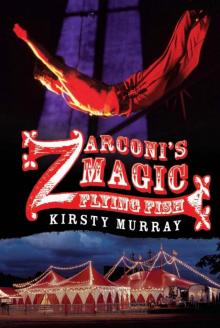 Zarconi’s Magic Flying Fish
Zarconi’s Magic Flying Fish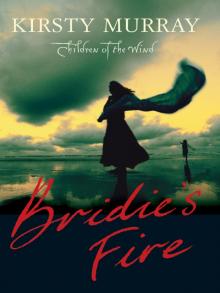 Bridie's Fire
Bridie's Fire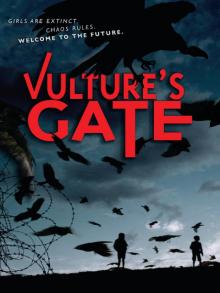 Vulture's Gate
Vulture's Gate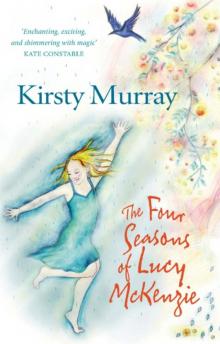 The Four Seasons of Lucy McKenzie
The Four Seasons of Lucy McKenzie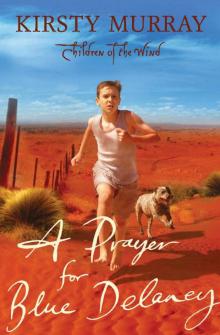 A Prayer for Blue Delaney
A Prayer for Blue Delaney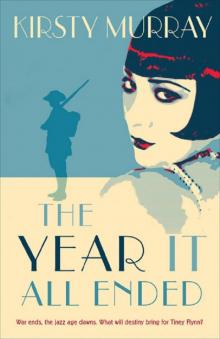 The Year It All Ended
The Year It All Ended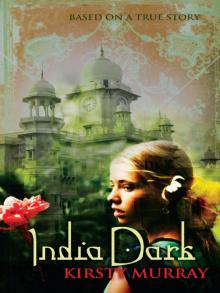 India Dark
India Dark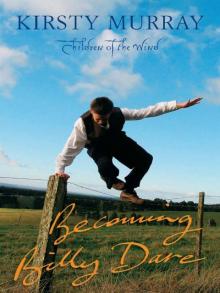 Becoming Billy Dare
Becoming Billy Dare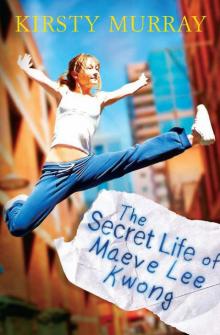 The Secret Life of Maeve Lee Kwong
The Secret Life of Maeve Lee Kwong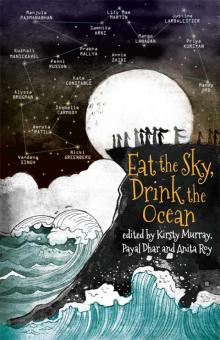 Eat the Sky, Drink the Ocean
Eat the Sky, Drink the Ocean